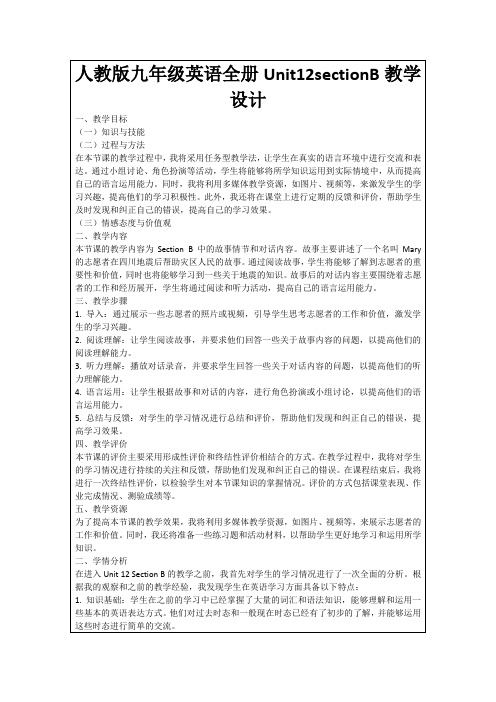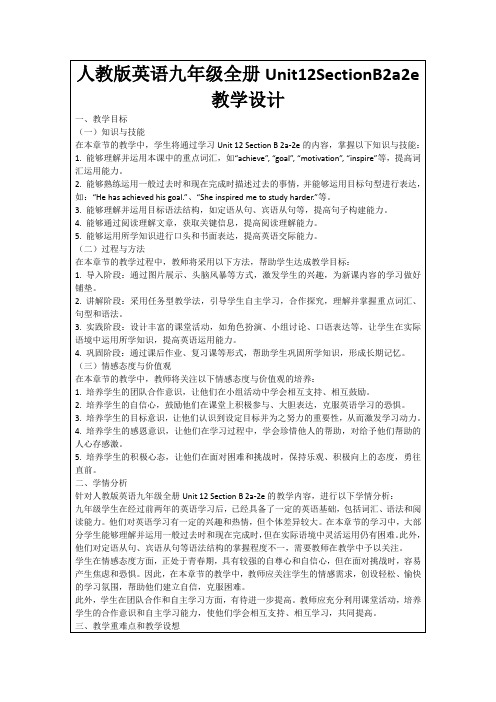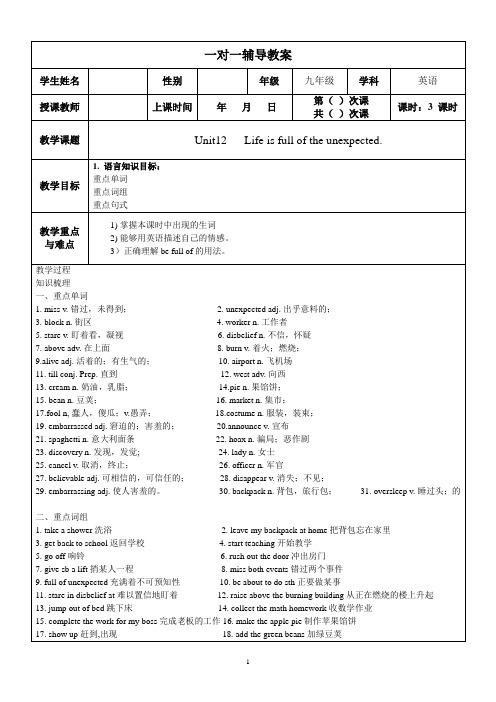人教版九年级英语12单元教案
人教版九年级英语全册Unit12sectionB教学设计

(一)导入新课
在导入新课环节,我首先通过展示一些志愿者的照片或视频,引导学生思考志愿者的工作和价值。我会提问学生:“你们认为志愿者的工作是什么?他们为什么愿意无私奉献自己的时间和精力?”通过这样的问题,激发学生的思考和兴趣,引发他们对志愿者工作的关注。
接着,我会告诉学生:“今天我们将学习一个关于志愿者的故事,故事发生在中国四川地震后的灾区。让我们一起来了解志愿者在灾区的工作和经历。”通过这样的导入,将学生的注意力引到本节课的主题上,激发他们的学习兴趣。
1.语言知识:本节课涉及到的词汇和短语较多,如volunteer, earthquake, survival, relief等。同时,学生还需要掌握一些特定的表达方式,如“做某事的志愿者”可以用“volunteer to do something”来表达。
2.时态运用:本节课的主要时态是一般过去时。学生需要能够正确运用一般过去时描述过去发生的事情,以及运用一般现在时描述现在的状态。
3.学习需求:学生对真实语境中的语言运用有一定的需求。他们希望通过学习英语能够更好地理解和表达真实情境中的信息。因此,在教学过程中,我需要提供更多的语言实践机会,让他们能够在实际情境中运用所学知识。
4.学习困难:学生在语言运用方面存在一定的困难。他们往往能够在理解上取得较好的成绩,但在将所学知识运用到实际交流中时,可能会出现表达不准确或语法错误的情况。此外,一些学生可能在听力方面存在一定的困难,需要通过更多的练习来提高他们的听力理解能力。
4.个性化辅导:针对学生的学习困难,提供个性化的辅导和指导。例如,对于一些在语言运用方面有困难的学生,可以针对性地进行口语练习,帮助他们提高语言表达的准确性。
5.反馈与评价:在教学过程中,及时给予学生反馈和评价,帮助他们发现和纠正自己的错误。同时,鼓励学生进行自我评价和同伴评价,培养他们的自我反思和评价能力。
人教版英语九年级全册Unit12SectionB2a2e教学设计

针对人教版英语九年级全册Unit 12 Section B 2a-2e的教学内容,进行以下学情分析:
九年级学生在经过前两年的英语学习后,已经具备了一定的英语基础,包括词汇、语法和阅读能力。他们对英语学习有一定的兴趣和热情,但个体差异较大。在本章节的学习中,大部分学生能够理解并运用一般过去时和现在完成时,但在实际语境中灵活运用仍有困难。此外,他们对定语从句、宾语从句等语法结构的掌握程度不一,需要教师在教学中予以关注。
2.能够熟练运用一般过去时和现在完成时描述过去的事情,并能够运用目标句型进行表达,如:“He has achieved his goal.”、“She inspired me to study harder.”等。
3.能够理解并运用目标语法结构,如定语从句、宾语从句等,提高句子构建能力。
4.能够通过阅读理解文章,获取关键信息,提高阅读理解能力。
2.邀请学生分享他们所崇拜的人物及其成就,引导他们用一般过去时描述这些成就,为新课的学习做好铺垫。
3.教师简要介绍本节课的学习目标,让学生明确学习内容,激发学习兴趣。
(二)讲授新知
1.教师呈现新课文中的人物和事件,引导学生关注重点词汇、句型和语法结构。
2.通过对课文的分析,讲解一般过去时和现在完成时的区别与联系,举例说明两种时态在实际语境中的应用。
5.能够运用所学知识进行口头和书面表达,采用以下方法,帮助学生达成教学目标:
1.导入阶段:通过图片展示、头脑风暴等方式,激发学生的兴趣,为新课内容的学习做好铺垫。
2.讲解阶段:采用任务型教学法,引导学生自主学习,合作探究,理解并掌握重点词汇、句型和语法。
三、教学重难点和教学设想
(一)教学重难点
1.重点:本章节的重点在于学生对重点词汇、句型和语法的掌握,以及能够运用所学知识进行阅读理解和口头、书面表达。
人教版九年级英语第十二单元教案

湖口中学九年级英语学科教学设计九年级英语学科教学设计课外拓展教学反思在教学中,教师要尽量用英语进行教学,语速自然停顿恰当,不给学生在大脑中进行英汉转换的时间。
课堂上,教师如果用英语阻止课堂教学,刚开始学生可能不太适应,但如果坚持做下去,学生的听说能力,语言运用能力就会逐渐增强。
课堂应力求形式多样。
每天课前热身对话,让不少学生改掉害羞、怕开口的毛病。
从而把学生带入轻松活泼的教学活动中。
九年级英语上册期末试卷学校____________________ 姓名__________________ 准考证号__________________听力理解(共30分)一、听对话,从下面各题所给的A、B、C三个选项中选择与对话内容相符的图片。
每段对话你将听两遍。
(共5分,每小题1分)1.A.B. C.2.A.B.C.3.A.B. C.4.A.B.C.5.A.B.C.二、听对话或独白,根据对话或独白的内容,从下面各题所给的A、B、C三个选项中选择最佳选项。
每段对话或独白你将听两遍。
(共15分,每小题1.5分)请听一段对话,完成第6至第7小题。
6. What day is better for the boy to do sports?A. Monday.B. Tuesday.C. Wednesday.7. What sport does the boy like?A. Volleyball.B. Basketball.C. Tennis.请听一段对话,完成第8至第9小题。
8. What are the speakers mainly talking about?A. School life.B. Family members.C. People at the party.9. What is Jenny like?A. She is friendly.B. She is boring.C. She is quiet.请听一段对话,完成第10至第11小题。
人教版九年级英语下册Unit 12教案导学案有反思

Unit 12Life is full of the unexpected.第一课时Section A(1a-2d)Target Navigation【目标导航】Key words and phrases:unexpected,backpack,oversleep,give…a lift,by the time(that)Key sentences:(1)By the time I got up,my brother had already gotten in the shower.(2)When I got home,I realized I had left my keys in the backpack.(3)When I woke up it was already 8:00 a.m.!(4)Before I got to the bus stop,the bus had already left.Skills:能听懂别人叙述过去的事情,能初步运用由when/before/by the time(that)引导的时间状语从句叙述过去的事件。
Emotion:通过让学生叙述过去发生的事件,让学生学会倾听,学会关心别人。
The guidance of learning methods【学法指导】听说法,小组合作角色扮演。
Learning important and difficult points【学习重难点】1.能听懂别人叙述过去的事情。
2.能初步运用由when/before/by the time引导的时间状语从句叙述过去的事件。
3.掌握Key sentences中的四个句型。
Teaching Steps【教学过程】Autonomous Learning Scheme【自主学习方案】☞预习指导与检测(一)预习指导1.预习Page 89、90的生词和短语,根据音标会读记。
2.朗读Page 89、90的句子,能英汉互译。
九年级英语第 十二 单元教案人教版

Unit 11 Could you please tell me where therestrooms are ?第一课时单元分析与提示教学目标语言目标:1、了解一些国家的饮食起居、生活习惯和文化异同,并用学习的知识表达自己对生活习惯的看法。
2、掌握一些与礼节、就餐等相关的词和词组。
3、加强对外国风俗和了解,扩大知识面。
认知目标1、掌握的词汇和目标语言be supposed to do; shake hands (with); drop by;should have done sth; a bit; make plans to do sth/for sthafter all; pick up; point at, point to, point out的用法;thanks for……的用法; except, besides, but的用法区别;most, mostly, the most的用法区别;be used to do sthused to do sth, be used to do sth, be/get used to sth/doing sth的用法2、学习感叹句、表语从句及非限制性定语从句情感目标本单元以谈论“习俗“为话题,了解各地不同的文化知识,从而让学生知道哪些是应该做的,哪些是不应该做的,要学会尊重不同的文化,养成良好的行为习惯,培养学生的学习兴趣。
教学重、难点感叹句常见的感叹句有两种句式:1、What a/an + adj. + n.(单数)+主语+谓语部分!What + adj. + n.(复数)+ 主语+谓语部分!What + adj. + n. (不可数)+ 主语+ 谓语部分!2、How + adj./adv. +主语+ 谓语部分!What a clever boy Tom is!What beautiful flowers they got!How quickly Lucy is running !注: How I wish to see you !我多么希望见到你啊!How they want to go there !他们多想去那儿呀!非限制性定语从句This is because they come from a computer program called ICQ, which means I seek you.句中which means I seek you属于非限制性定语从句。
人教版九年级英语全一册第十二单元Unit12教案

A. had started learningB. have started learningC. started to learnD. started learning
【解析】by the time所引导的从句是一般过去时,其主句要用过去完成时。正确答案是A。
19. embarrassed adj.窘迫的;害羞的;20.announce v.宣布
21. spaghetti n.意大利面条22. hoax n.骗局;恶作剧
23. discovery n.发现,发觉; 24. lady n.女士
25. cancel v.取消,终止;26. officer n.军官
A. were learningB. have learntC. learnt D. had learnt
【解析】由时间状语By the end of last year可知应用过去完成时,即“had+过去分词”。正确答案是D。
3. Since 2000, Nanchang has become a new city. Everything ____.
当他把面条放进碗里时,他意识到他忘了添加绿豆荚了。
7. Before she got a chance to say goodbye, he had gone into the building.
在她得到一个向他告别的机会之前,他已经进入楼房了。
Section A(1a ~ 2d)
a.词汇包:by the time到……时候
b.句式包:
1.By the time I got outside, the bus had already left.当我出来的时候,公共汽车已经走了。
人教版九年级英语12单元教案

Unit12 You are supposed to shake hands.重点短语词组应该做某事be to do sth 握手访问by 毕竟本应该做但没做have done 餐桌礼仪table到达at/in 有点晚late习惯于某事be/get to sth 习惯于做某事be/get sth 被用于做某事be sth 被用作.... Be过去常常做某事sth 特地,不怕麻烦的做某事使某人感到宾至如归计划做某事sth没有理由have 注意你的行为your manners发出噪音make (a) 做鬼脸make自学....by oneself 在适当的时间at the time 以......开始begin 忍不住做某事can't sth代替of 对某事随意be sth邀请某人做某事sb sth 指向重点短语句型讲解:1. Y ou should have asked what you were supposed to wear.你本应该问清楚怎么样穿才得体。
中的“should have asked”是“情态动词+现在完成时”表示过去本应该做某事,事实上没有做,这是虚拟语气的一种表达方式。
如:She should have gone to Beijing. 她本应该去了北京。
(没有去)同时was/were supposed to do sth 表示过去本该做某事而实际上并没有做,就相当于should have done sth.2. make (some) mistakes 犯了(一些)错误。
make a mistake 犯错误(一个)与mistake相关的短语by mistake 错误地mistake…for…把..误认为…5.relaxed:用来形容人,表示人本身很放松,主语一般是人。
relaxing:指物,表示事物可使人很放松。
I feel really after the vacation.经过这次令人放松的假期后我感到很放松。
人教版九年级英语第十二单元教案

Unit 12 Life is full of the unexpected. 全单元教案【单元教学内容分析】本单元围绕“Bad days ”这一话题进行教学活动。
运用“By the time…,sb had already done….”句型谈论发生在身边的令人尴尬或难忘的事,学习和巩固过去完成时态。
本单元的核心语言项目是“Narrate past events”,通过一系列的听说读写的训练,加深学生对过去完成时态的理解,在学习和运用过去完成时态的过程中,进一步掌握动词的过去式和过去分词的变化规则,区别现在完成时及过去完成时的用法,最终达到将目标语言运用到真实的生活语境的目的,让学生在用中学,在学中用。
【教学目标】知识目标:1.用过去完成时态来谈论过去发生的事情。
2.正确运用一般过去时,现在完成时,过去完成时叙述自己的难忘经历,并注意事情发展的先后顺序.3.谈论愚人节发生的一些有趣的故事。
语言功能:用过去完成时态来谈论过去发生的事情。
语言结构:过去时态和过去完成时。
重点词汇及短语:oversleep, exhausted, embarrassed, fool, rush, describe, lock, flee, reveal, convince, get married, on time, empty, show up, break down, get dressed.重点句型:What happened?I overslept. And by the time I got up, my brother had already gotten into the shower.When I got to school, I realized I had left my backpack at home.情感目标:1.学会合理安排时间,养成良好的习惯,增强做事的计划性.2.能通过交流分享难忘的经历,增进彼此的了解,学会沟通3.了解西方国家愚人节发生的事情,学会理智地分析事件,不愚弄人.【教学重点】过去完成时的构成及应用。
- 1、下载文档前请自行甄别文档内容的完整性,平台不提供额外的编辑、内容补充、找答案等附加服务。
- 2、"仅部分预览"的文档,不可在线预览部分如存在完整性等问题,可反馈申请退款(可完整预览的文档不适用该条件!)。
- 3、如文档侵犯您的权益,请联系客服反馈,我们会尽快为您处理(人工客服工作时间:9:00-18:30)。
人教版九年级英语12单元教案-CAL-FENGHAI-(2020YEAR-YICAI)_JINGBIANUnit12 You are supposed to shake hands.重点短语词组应该做某事 be to do sth 握手访问 by 毕竟本应该做但没做 have done 餐桌礼仪 table到达 at/in 有点晚 late习惯于某事 be/get to sth 习惯于做某事 be/get sth被用于做某事 be sth 被用作.... Be过去常常做某事 sth 特地,不怕麻烦的做某事使某人感到宾至如归计划做某事 sth没有理由 have 注意你的行为 your manners发出噪音 make (a) 做鬼脸 make自学 ....by oneself 在适当的时间 at the time以......开始 begin 忍不住做某事can't sth代替 of 对某事随意 be sth邀请某人做某事 sb sth 指向重点短语句型讲解:1. Y ou should have asked what you were supposed to wear.你本应该问清楚怎么样穿才得体。
中的“should have asked”是“情态动词+现在完成时”表示过去本应该做某事,事实上没有做,这是虚拟语气的一种表达方式。
如:She should have gone to Beijing. 她本应该去了北京。
(没有去)同时was/were supposed to do sth 表示过去本该做某事而实际上并没有做,就相当于should have done sth.2. make (some) mistakes 犯了(一些)错误。
make a mistake 犯错误(一个)与mistake相关的短语 by mistake 错误地 mistake…for…把..误认为…5.relaxed:用来形容人,表示人本身很放松,主语一般是人。
relaxing:指物,表示事物可使人很放松。
I feel really after the vacation.经过这次令人放松的假期后我感到很放松。
3. …it’s okay if you arrive a bit late….即使你晚到一会也没关系。
a little 与 a bit 二者都是“有点儿”的意思。
(1)二者相同之处在于①都可做状语,修饰比较级 He is a bit/ a little older than you.②都可做主语或宾语。
Please give me a bit/ a little.(2)不同之处在于:两者修饰名词时,a little可以直接加名词,a bit必须加of后才能接名词。
A little money = a bit of money4. drop by 顺便拜访串门We just dropped by our friends’homes.我们刚刚去朋友家串门。
drop in/on sb 顺便走访某人。
Would you drop in/on us this evening for a chat你今晚过来和我们聊聊好吗5. invite sb. to do sth. 邀请某人做某事如:Lily invited me to have dinner.莉莉请我吃晚饭。
6. without .prep.没有. 其后常接名词、代词和动词ing形式。
Jim今天早上没吃早饭就去学校了。
7. around the world == all over the world 全世界8.at the table 在饭桌旁 at table 在吃饭类似的短语还有: in hospital by sea 由海路 in future从今以后in the hospital by the sea在海岸上 in the future在将来9.pick up sth 捡起挑选如:He picked up his hat. 他捡起他的帽子。
如果宾语是代词需置于pick与up之间 pick it up10. start doing == start to do 开始做某事如He started reading.== He started to read. 他开始读。
11. point at 指着 at是介词,后跟动作的目标。
女孩正指着墙上的地图。
point to 指向 to是介词,后跟动作的方向。
当point做及物动词讲时,常用于point sth at sth 用…指着You shouldn’t point your finger at anyone.你不应该用手指任何人。
12. stick v. 剌截stick…into….把…插入…别把叉子插入食物中。
n. 棒,棍请递给我那根棍子。
chopsticks 筷子是由chop(砍)+stick(棒)合成,通常用复数形式:chopsticks13. be different from 与…不同 Chinese food is different from theirs. 中国菜与他们的不同.be different in…在…方面不同这两件毛衣在颜色上不一样。
14.I find it difficult to remember everything. 我发现要记住每一样事是困难的。
形式宾语真正宾语常见的形式宾语有:find / think + it/them +形容词 to do sth. 如:I think it hard to study English.15.Everying was unfamiliar.一切都是那样的陌生。
Be familiar/unfamiliar to sb 为某人所熟悉/不熟悉That face is unfamiliar to me.Be familiar/unfamiliar with sth 对某物熟悉/生疏 I’m unfamiliar with that face.16. And I had not just one set to use, but two or three of each.Not…but…不是…而是…,用来连接连个并列成分。
他们不是需要钱,而是需要时间。
Not…but…连接两个主语时,谓语动词遵循就近原则。
不是黎明而是黎明的父母去了长城。
17. Was I supposed to begin with the largest ones or the smallest?Begin with 以…开始第二课以一首歌开始。
n, beginning from the beginning 自始,从一开始at the beginning of …在…的开始(初) from beginning to end 至始至终at the beginning of December at the beginning of Winter18.E-mail English is a new kind of written English that is being used to save time.电子邮件英语是一种新型的用来节省时间的书面英语。
(1)that is being used…是一个定语从句,修饰前面的written English. 定语从句用的是现在进行时的被动语态,that在定语从句中做主语,不能省略。
(2)written English 书面英语 spoken English 英语口语 written 与 spoken 是过去分词形式,均表被动关系,充当形容词,做前置定语。
(3)在英语中表示“被动关系”的有两种形式,一种是过去分词做定语,一种是被动语态。
The novels written by Lu Xun are very educational.鲁迅写的小说很具有教育意义。
The novels are written by Lu Xun.这些小说史鲁迅写的。
英语中表示“正在进行”的有两种形式,一种是现在分词做定语/宾补,一种是进行时态。
I found a wallet lying on the ground. (做宾补)The girl singing the song is my younger sister. (做定语)19.This is because they come from a computer program called ICQ, which means I seek you.20. can’t stop doing 忍不住做某事=can’t help doing sth.I can’t stop laughing. 我忍不住笑.当听到这个消息,我忍不住哭了。
21…..it’s created by combining letters and symbols or numbers to sound like other words….(1)be created by 由……组成,by是介词,后接名词、代词或动名词作宾语。
(2) combine .v. (使) 结合,混合 combine…and…将…和…混合起来combine…with…将…与…合并 Combine “tele” with “communication”, we’ll get a new word “telecom”.22.Do these two on your own…独自做这两道题….On one’s own 独自的,主动的,自愿的。
在句中做状语。
他现在自食其力。
Of one’s own 属于某人自己的,of前常接名词或不定代词。
We have no house of our own.With one’s own 用某人自己的, own后接名词。
Remember to do everything with your own ideas. 记着用你自己的想法去做事情。
23. cut up 切开切碎如:Let’s cut up the water melon. 让我们切开这个西瓜吧。
make faces做鬼脸 face to face 面对面练习题Section A一、选词填空(用wear , put on, dress的适当形式填空)1. It’s very cold outside, ________ your coat.2. The girl who ________ in light blue is my sister.3. Many girls ________ shirts in summer time.4. Sally’s sister is old enough to ________ herself.5. “Could you ________ the children for me ”she asked her husband.6. She ________ a new sweater today.7. Lily ________a flower in her hair yesterday.8. He ________ his glass to read the letter.二、单项选择( )1. They _____ a football match if it _____ fine next Thursday afternoon.A. will have; will beB. have; will beC. will have; is( )2.----Shall I ask Lillian to see the film with us?---- I don’t think she will. She _____ it twice. A. saw B. has seen C. sees( )3.Qingdao is one of the best places for _____ in China. A. surfing B.surf C. surfs( )4. We _____ shake hands when we meet someone for the first time.A. supposeB. suppose ofC. are supposed to( )5. Li Ying told me _____ for her at home. A. waits B. wait C. to wait( )6. I _____ my homework already. A. finish B. have finished C. finished( )7. ---- If you _____ a new idea, please call me as soon as possible.---- Sure, I will. A. keep up with B. catch up with C. come up with( )8.Most of the girls in our class enjoy _____ music.A. listening B. listen to C. listening to ( )9. Ted ten dollars on the shirt yesterday. A. cost B. spent C. paid( )10. I want to know whether . A. will he give back the bookB. he gives back the bookC. he will give back the book( )11.They some plans for the coming summer vacation.A. have madeB. has madeC. makes( )12. Lily planed her uncle the next day. A. to visit B. visiting C. visit( )13. Do you know Mr Green come to China A. when B. what C.where( )14. --- Would you like something to drink---- .A. No, thanks.B. Yes.C. Not at all.( )15. Do you know a sports meeting next FridayA. what there will to beB. if there is going to beC. there was going to have( )16. Who can help me do the workA. otherB. elseC. another( )17. ---- May I speak to Li Hua, please----I’m afraid he isn’t in. Would you like to a messageA. takeB. writeC. leave( )18. ---- Do you want a pear of an orange--- . I really don’t mind.A. NeitherB. EitherC. Both( )19. ---Excuse me, I want to know . ---I parked it behind this building.A. where did you park my carB. where you parked my carC. how you parked my car( )20. I can’t say I want to visit my grandpa. It’s a long time since we met last time.A. how oftenB. how longC. how soon D how much( )21. Thanks for me with my English. A. help B. helping C. helped( )22. He the phone and began to dial the number.A. pick upB. picks upC. picked up( )23. The hand of the clock is pointing eleven o’clock. A. to B. at C.out( )24. I’m really thirsty. I’ll stop .A. to take a drink B. taking a drink C. take a drink ( )25. Don’t . Your father is sleeping. A. turn off the TV B. make any noise C. be quiet ( )26. Nothing can make him his goals. A. to give up B. give in C. give up( )27. ---- were you away from home last year?---- About one month. A. How often B. How far C. How long( )28. He didn’t understand yesterday.A. what the teacher says.B. what the teacher saidC. what did the teacher say( )29. Could you tell me A. how long the Fujiang River was B. how long was the Fujiang RiverC. how long the Fujiang River isD. how long is the Fujiang River( )30. Traveling by train is cheaper and enjoyable than by air.A. more; much moreB. quite; much tooC. very; very muchD. much; far more( )31. It’s rude you to speak loudly in public. A. of B. for C. to( )32. The room was of smoke. A. full B. fill C. filled( )33. good information he has got! A. What a B. What C. How a( )34. clever boy he is ! A. What B. What a C. How a( )35. Could you please help me cut these potatoesA. upB. offC. down( )36. A good idea occur him. A. to B. at C. for( )37. It was eleven o’clock when he arrived Paris. A. in B. at C. to( )38. My grandpa is used to a walk in the morning. A. have B. has C. having( )39. Great changes in my hometown.A. have been taken placeB. have taken placeC. has taken place( )40. --- Bob is late for school. ----Neither am I .A. always B. never C. ever.( )41. The problem is we should do at first. A. that B. what C. which( )42. Mr Gereen has got used to with chopsticks. A. eat B. ate C. eating( )43. The girl is making plans her little brother with his lessons.A. helpsB. to helpC. helping( )44. What you to do before going to bed?A. did; supposeB. are ; supposingC. are ; supposed( )45. Without a word, he left home. A. says B. say C. saying( )46. The street is people on Sunday. A. crowded with B. crowd with C. crowd( )47. Bob, there is a book on the floor, please .A. pick it up B. pick up it C. picks it up( )48. Xiao Lin is a good students, he behaves .A. well B. good C. badly( )49. The town we visited a few years ago is much larger than before.A. itB. whoC. which( )50. --- You will go swimming this Saturday, won’t you?--- . I have to work this Saturday. A. Yes, I will B. Yes, I won’t C. No, I won’t三、完成句子1. There’s only (一点儿,少许)milk left, could you get some on your way home?2. Do you (握手)with each other when you meet someone for the first time?3. I (拜访)the writer on my way home yesterday.4. Though he (犯了一些错误), he is still a good boy.5. He said, “Miss Li, I’m sorry for (迟到).”6. I had a stomachache because of (错吃了食物).7.You (本应该完成家庭作业) yesterday but you didn’t’8. They (计划)take a vacation next week.9. The students are (制订计划) for the new term.10. ---- How’s everything---- .(还不错)11. He smiled, (毕竟) he succeeded at last.12. I don’t think English is (难得多) than Chinese.13. They (特地)to see me every month.14. You (本应该到达)here at 8 o’clock, but you’re late.15. The little girl (擦去)off the tears and laughed.16. 除最后一个问题没答外,其余问题他都答了。
